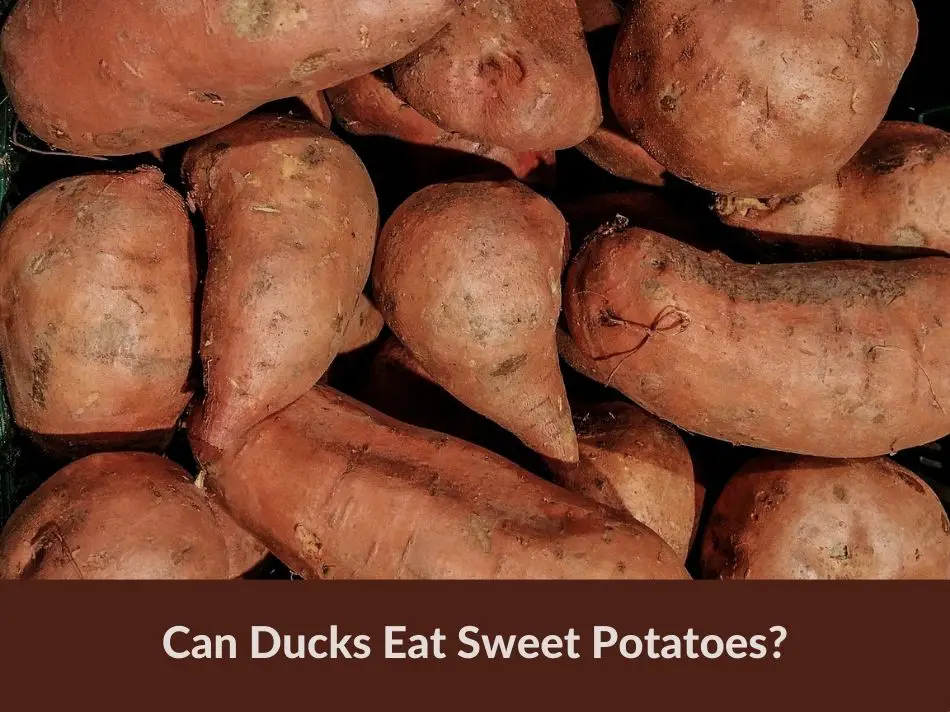Generally, ducks enjoy a diet consisting of grains, seeds, small fish, and insects. Commercial waterfowl feed is also widely available for domestic ducks, which meets most of their nutritional needs. Natural vegetation and occasional treats can also be part of their diet. But, can ducks eat sweet potatoes?
Yes, ducks can eat sweet potatoes. These root vegetables are packed with essential nutrients that can benefit the duck’s health. Sweet potatoes should be cooked and cut into small pieces to make it easier for ducks to digest. Raw sweet potatoes can be tough on their digestive systems.
In this article, we’ll go over ducks eating sweet potatoes, how often they should be fed this tasty treat, and the nutritional benefits it offers.
How Often Can I Feed My Ducks Sweet Potatoes?
Moderation is key here. Sweet potatoes are rich in carbohydrates and should be offered as a treat rather than a regular diet component. Once or twice a week should suffice. Overfeeding can lead to nutritional imbalances and obesity. It’s like feeding them duck doughnuts, delightful but not ideal for everyday consumption.
Can Ducklings Eat Sweet Potatoes?
For the adorable little quackers, sweet potatoes can be introduced, but it’s best to wait until they’re a bit older. Their primary diet should consist of specialized duckling feed, rich in protein and essential nutrients. If you choose to give them sweet potatoes, make sure they are cooked thoroughly and cut into small, manageable pieces.
Sweet Potatoes Nutritional Value
Below is the nutritional value of 100 grams of sweet potatoes.
- Calories: 86
- Protein: 1.6 grams
- Carbohydrates: 20.1 grams
- Fiber: 3 grams
- Water: 77 grams
It also contains several vitamins and minerals as listed below.
- Vitamin A
- Vitamin C
- Manganese
- Copper
- Pantothenic acid
- Vitamin B6
- Potassium
- Niacin
Are Sweet Potatoes Healthy for Ducks?
Certainly, sweet potatoes are a good source of essential vitamins such as Vitamin A, Vitamin C, and various B-vitamins, all beneficial for a duck’s health. They also offer valuable minerals like manganese, copper, and potassium. However, it’s important to remember that moderation is key, as excessive consumption can lead to nutritional imbalances.
- Vitamin A: This vitamin is crucial for vision and overall cellular health in ducks. A lack of it can lead to vision issues and feather disorders.
- Vitamin C: Although ducks can produce Vitamin C, extra amounts can assist with wound healing, feather growth, and immune function.
- Manganese: Important for bone health and eggshell formation, manganese is essential especially for laying ducks.
- Copper: This mineral is vital for metabolic functions, including iron metabolism and the maintenance of the central nervous system.
- Pantothenic Acid (Vitamin B5): Helps in the metabolic process, breaking down fats, proteins, and carbohydrates for energy.
- Vitamin B6: Essential for protein metabolism and mood regulation, Vitamin B6 keeps ducks both healthy and happy.
- Potassium: Regulates fluid balance and muscle function, helping ducks with movements like paddling and flapping.
- Niacin (Vitamin B3): Important for energy production and skin health, a deficiency in niacin can result in poor growth and feather quality.
How To Feed Sweet Potatoes To Ducks
Feeding sweet potatoes to ducks involves a few simple but important steps to ensure the treat is both nutritious and easy to digest. Here is a quick guide to help you:
- Choose Organic Sweet Potatoes: Opt for organic sweet potatoes when possible, as these are free from harmful pesticides and chemicals.
- Wash and Peel: Before cooking, wash the sweet potatoes thoroughly to remove any dirt. Peeling is optional, but it can make it easier for the ducks to eat.
- Cook the Sweet Potatoes: Raw sweet potatoes can be hard on a duck’s digestive system, so it’s best to cook them beforehand. You can either boil or steam them until they are soft.
- Cool Down: After cooking, allow the sweet potatoes to cool down to room temperature. This ensures that you won’t accidentally burn the ducks’ mouths or digestive systems.
- Cut into Small Pieces: Dice the cooked sweet potatoes into small, bite-sized pieces that are easy for ducks to eat.
- Avoid Seasoning: Don’t add any salt, spices, or butter to the sweet potatoes. Ducks don’t need these additives, and some could be harmful to them.
- Serving Portion: Offer the sweet potatoes in a shallow dish or spread them out on a clean surface. Make sure to distribute the pieces evenly so each duck gets a chance to partake.
- Provide Fresh Water: Always make sure to offer fresh, clean water alongside the sweet potatoes. Ducks need water to aid in digestion and to help swallow their food.
- Observe: After feeding, observe your ducks for a few minutes to ensure they are eating the sweet potatoes without difficulty and to make sure there are no adverse effects.
- Clean Up: After the feeding session is over, promptly remove any uneaten sweet potatoes to prevent them from spoiling.
More Vegetables Ducks Can Eat
In addition to sweet potatoes, ducks can safely consume a variety of other vegetables as treats. These can offer ducks essential nutrients and variety in their diet. Below are some more vegetables duck can enjoy.
Conclusion
Sweet potatoes can be a nutritious and delightful treat for your ducks when offered in moderation. Whether you’re a caretaker of a domestic flock or a park visitor looking to offer a healthier snack to the local waterfowl, sweet potatoes are a solid choice.
Just make sure it’s cooked and cut into smaller pieces to avoid choking risk.
Disclaimer: The information in this article is for informational purposes only. I'm not an expert or a veterinarian.


